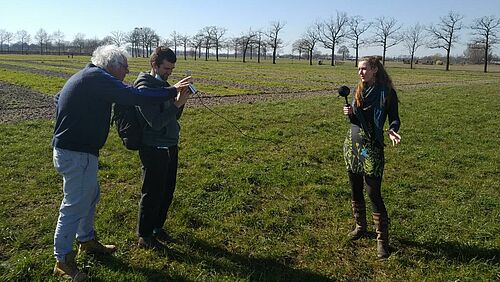When and with what goal did you start the mentoring programme?
I started the program in 2016-2017. I wanted to get more connection to the academia in Rostock and see more than my work group. Also, I wanted to gain professional skills and was interested in the option to get an Mentorin. It was actually my own Professorin who proposed the program and even helped me finding a Mentorin, this was hard for me as a foreigner in Germany. I’m very thankful she did.
What did you benefit from most during the mentoring period?
I really benefitted from the seminars and courses, and the peer mentoring. I connected really well with my Mentorin, but she was in Mutterschutz for most of my time, so I did not manage to make the most of our coaching. But the seminars and courses really helped my find new skills, explore different options, and get many interesting teachers. They challenged me at times, especially as a non-native speaker, but this really pushed me out of my comfort zone. All were great, but somehow the one on self-confidence and how to convey power was really interesting. This helped me greatly in adapting my body language, giving more convincing presentations, staying relaxed in job interviews, and being assertive about my strengths.
The peer group was amazingly supportive. Discussion situations at work, or relationships with supervisors, with other women who are so kind and strong really inspired me. Also, being able to discuss this sort of ‘savely’ without the worry of the workgroup knowing, was a real blessing. Watching my peers grow and develop during the program was so inspiring to witness! Women who were too shy to stand up against bullies at work would give strong and moving speeches at the end of the program, peers finding their purpose, peers bringing their children to work.
I’m still in contact with my peer group and still try and collect people together in peer support groups.
What was your highlight in the mentoring relationship? What was particularly supportive?
Traveling to Berlin to meet her! And the fact she has a very different work style than my own Professorin. This turned out really complementary. Their feedback and ideas combined was the best of both worlds. I also appreciated how she combined work and family, and she was an ‘international’ working in German academics.
What strengths did you gain from participating in the mentoring programme?
After my contract ended I gave two very successful job interviews, which I fully attribute to the mentoring program. Firstly, it gave me both more clarity on my personal goals (going into education rather than pure research), and secondly, it gave me more confidence during the interview (being able to calm and confidently state my strengths, and address my weaknesses in a constructive way). Due to bureaucratic reasons the first position as PostDoc didn’t work out, but it landed me the second job as university lecturer, in which I am actually way more happy as it fits my skill set better.
What would you like to pass on to the current mentees?
1. To be brave! Really! As an educator/supervisor/lecturer I still see way too many strong and smart women who are too careful and too fearful to speak up, stand out, take space, ask questions, make mistakes, or be creative. This is your career, your life; so stand up for your opinion, your dreams and wants, run with it!
2. Be kind, be aware that every one is just winging it, bluffing, and nobody knows what their doing. Next to braveness, there is such a need for more feminine energy in academics! So don’t be afraid to be kind and supportive, instead of this (male) imposed cut-throat competitive attitude that serves nobody. Build (women) peer groups, get together, network, support, and help each other colleagues.

